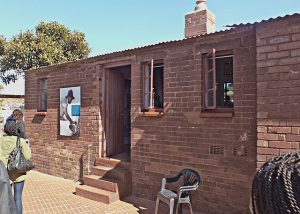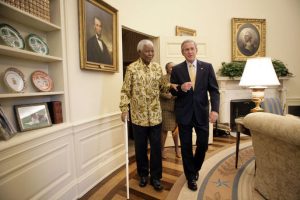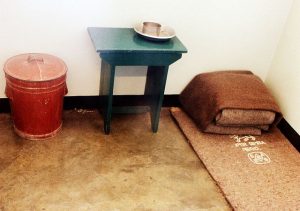Last updated on July 29th, 2022
Nelson Rolihlahla Mandela, who served as the President of South Africa between 1994 and 1999, was the country’s first black chief executive. He is known as “the worlds most famous political prisoner” and “South Africa’s Great Black Hope.” With these 47 interesting facts about Nelson Mandela, let’s learn more about his career, politics, early life, mission and struggle for the rights of black men and women.
Facts about Nelson Mandela’s: childhood, education, marriage, and imprisonment
1. Mandela’s middle name, “Rolihlahla,” literally means ‘pulling the branch of a tree,’ or colloquially, ‘troublemaker.’
2. In his family, Nelson Mandela was the first to receive formal education. At that time, very few black kids attained high school education in South Africa.
3. Nelson Mandela, when he became aware that his guardians arranged his marriage, fled to Johannesburg. He stole cattle and sold it to collect money for his travels.
4. During his initial days in Johannesburg, he took the job of a night watchman and then that of a law clerk to support his finances.
5. Nelson Mandela, after studying at both the University of Fort Hare and the University of Witwatersrand, started practicing law in Johannesburg.
6. In 1940, he was expelled from the University of Fort Hare for his involvement in a student strike.
7. In 1943, Nelson Mandela received his B.A. from Fort Hare.
8. In 1952, Nelson Mandela was convicted under the Suppression of Communism Act, and was banned from leaving Johannesburg and participating in public gatherings. The same year, he formed the first black partnership in South Africa.
9. Mandela joined the African National Congress in 1944, and formed the ANC Youth League along with some others during the same year. The group was displeased by the policies and principles of the Congress, and wanted to erect their own party.
10. Mandela got married to nurse Evelyn Mase on July 15, 1944.
11. After the marriage, the couple settled in a three-room house, which had neither electricity nor an inside toilet. Mandela had four children with Evelyn Mase before their divorce in 1957.

12. Did you know that in 1962, Mandela also received guerrilla training in Morocco and Ethiopia?
Facts about Nelson Mandela’s: struggle, ANC, presidency, last marriage and anti-apartheid movement
13. Another cool fact about Mandela is that he was a master of disguise. He disguised himself as a fieldworker, a chauffeur or a chef. He used his talent to evade policemen who tried to arrest him. And finally when he was arrested, he was in a chauffeur’s outfit!
14. In his honor, his birth date of July 18 has been declared “Nelson Mandela International Day.” This is the first time that the UN has declared an International Day in honor of a person. See the full list here.
15. Nelson Mandela served as President of the African National Congress (ANC) party from 1991 to 1997.
16. During the 1994 election for the presidency, the majority of voters from the more than 22 million who turned out to cast ballots chose the ANC to lead the country, and Nelson Mandela was sworn in as President.
17. Nelson Mandela became South Africa’s first black president on May 10, 1994. He was the first South African president to be elected democratically, and also the oldest president to assume office.
Read: Interesting facts about South Africa
18. Nelson Mandela spent nearly 70 years of his life advocating for the rights of minorities in South Africa. He wanted to establish a free and non-racist society in the country, and inspire people all over the world. He was against discrimination, injustice and inequality; and he fought with stubborn resolve.
19. Did you know that there are hundreds of streets throughout the world that are named after Nelson Mandela (including – City of Cardiff, Wales, named a street after Nelson Mandela; Nelson Mandela Marg interchange, New Delhi, India; Nelson Mandela Street, Rio de Janeiro, Brazil; Nelson Mandela Street, Terre Rouge, Mauritius).
20. Nelson Mandela also spread awareness about AIDS and treatment programs for the deadly disease, which also cost him the life of his only son Makgatho (1950-2005). The disease affects more people in South Africa than any other country of the world.
21. Nelson Mandela married three times. His last marriage was at the age of 81 to Grace Michel. He had been married to Mozambique President Samora, who was a widow at the time of her marriage to Mandela.
22. Mandela also received support for the anti-apartheid movement from Robert Mugabe, the Zimbabwean president. Zimbabwe sheltered the anti-apartheid fighters in their territory during the struggle. Mandela also had close ties with Gaddafi, the Libyan dictator.
23. Interestingly, Nelson Mandela co-authored a book with Fidel Castro.
Read: Interesting facts about Zimbabwe
Noble Prize for Mandela
24. Nelson Mandela and F.W. de Klerk were jointly awarded the Nobel Prize for Peace in 1993, “for their work for the peaceful termination of the apartheid regime, and for laying the foundations for a new democratic South Africa.”

Nelson Mandela and his time in Jail
25. Nelson Mandela spent nearly 27 years of his lifetime in jail.
26. He spent 18 years of his imprisonment on Robben Island. During these years, he was allowed to meet his wife once every six months.
27. When Nelson arrived on the island with other political prisoners, their warden’s first words were: “This is the Island. This is where you will die.” The conditions on the island were difficult for the estranged prisoners.
28. Nelson, however, spent the remaining years of imprisonment in a jail near Cape Town. Here, he had access to radio, TV, newspapers and any visitors he wanted.
29. Each prisoner on Robben Island had a seven-foot cell, and they had to perform hard labor at limestone quarries.

30. During the time he was behind the bars, he earned a Bachelor of Law degree from the University of London, and educated his fellow prisoners to adopt a nonviolent approach to getting better treatment in the prison.
31. During the 27 years he was in jail, he was offered freedom from the prison on six different occasions by the apartheid government on certain terms, which he denied.
Continue reading on the next page…
